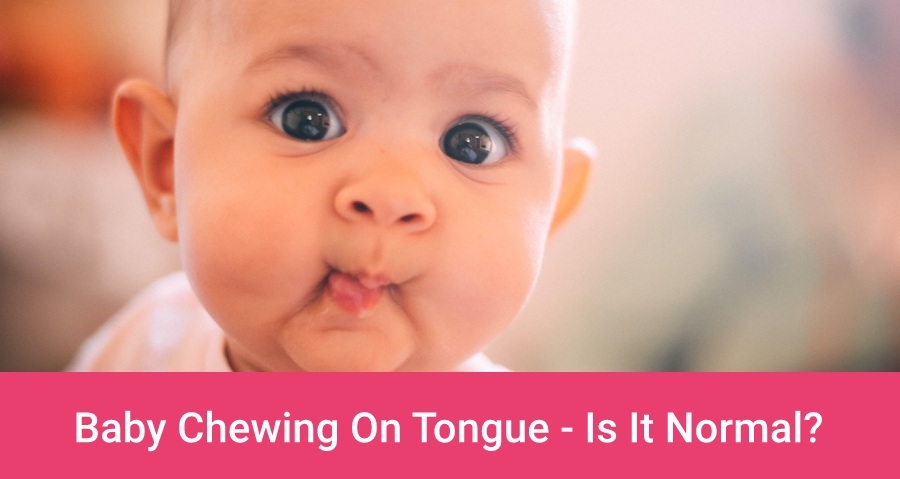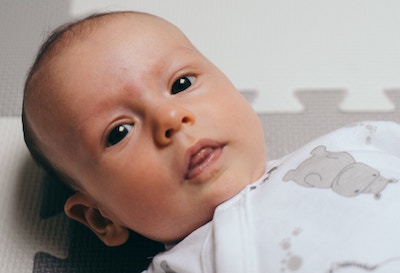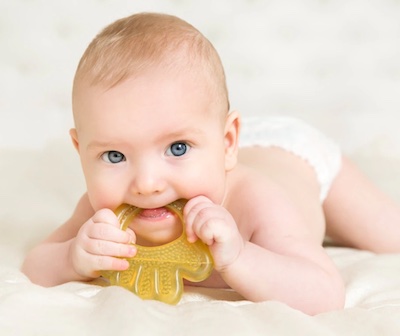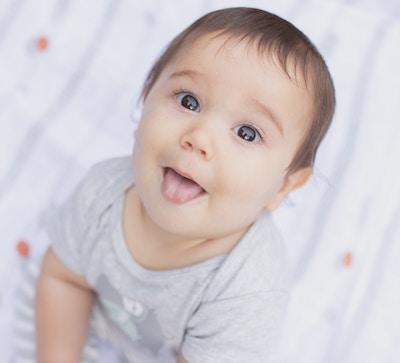Basically anything a baby does is adorable. However, sometimes an adorable habit like chewing on their tongue can also be a cause for worry. Are they teething? Is it time to start introducing solid foods? Could it be a sign of a developmental issue? Keep reading to find out!

Medically Reviewed by Jessica Pierce – Registered Nurse & Nationally Registered Paramedic
Seeing your baby chewing on their tongue can leave you concerned if this is a normal thing and looking for solutions on how to stop it. Does it mean that there is something wrong with your baby or maybe you’re doing something wrong?
Let me reassure you that tongue chewing is usually just fine. In this article I’m going to explain why it might be happening, when you should see a doctor, and provide some practical solutions like feeding schedule changes or chew toys that can help.
Is It Normal For Babies To Chew On Their Tongue?
Rest assured, mama, at least nine times out of ten baby’s tongue chewing habit is completely normal and a sign of development! If you see your baby tongue chewing, you don’t automatically have to be concerned1.
Not only is baby’s tongue chewing normal, it’s also pretty common. Tongue chewing in most cases is actually a form of communication. Keep reading to unlock the code!
Why Do Babies Chew On Their Tongue?
Babies chew on their tongues for a variety of reasons, depending on their age2.
Newborns Chewing On Their Tongue
In newborn babies, tongue chewing is a reflex behavior. Babies are born with several different reflexes that help them throughout their first days of life and help them learn how to feed. Some of these reflexes are the tongue thrust reflex (extrusion reflex) and the sucking reflex.
These reflexes help newborns latch on to the breast (or bottle nipple, if you’re bottle feeding). The tongue plays an important role in the sucking motion required to pull breast milk from the feeding nipple.
A newborn baby chewing on their tongue is most likely not even chewing at all. It’s probably the sucking reflex, designed to get breast milk into their mouth. The sucking reflex is also a common way that most babies self soothe.
Chewing the tongue at the newborn stage may indicate that your baby is interested in breastfeeding. This is one of the more common of baby’s hunger cues and is completely normal! It may signal a need for an adjustment in baby’s feeding schedule.

Why Does 2-Months-Old Chew On His Tongue?
Between two and four months of age, babies chew on their tongue as a form of self-soothing technique. They may also be discovering their tongue for the first time as well as continuing to learn how to use their tongue for breastfeeding and figuring out how to swallow.
Around this age, baby’s mouth is how they discover new things – that’s also why you may see your baby putting their hands or feet in their mouth as well. They’re just learning about themselves!
6-Month-Old Chewing On Their Tongue
By six months of age, the baby chewing tongue habit is most likely an indicator that they may be ready for solid foods. Chewing on their tongue is a way to practice the chewing motion they will need to master in order to eat solid foods.
One way to prevent tongue chewing at this age is to start slowly introducing solid food. Just ensure that you only introduce one new solid food at a time, and wait about a week to ensure your baby doesn’t have an allergy to it.
At this point, babies chewing on their tongue can also signal that they are teething. Tongue chewing or tongue biting could be a response to gum inflammation and teething pain. The best fix for this is to give teething toys to your teething baby.
Because of teething pain your baby may be also gagging on pacifier, because it’s simply not comfortable for them to use it.
Other signs that your baby may be teething include excessive drooling, swollen gums and crying or irritability. Try putting your baby’s favorite teething toy in the refrigerator or freezer to give some relief to baby’s gums.
What’s interesting, older teething baby may start to chew on their crib – this is a pretty common thing for babies from 8 months to 2 years.
How To Deal With Tongue Chewing Habit
Here are few tricks you can try to stop baby from chewing on their tongue3:
1. Fine Tune The Feeding Schedule
In younger infants, tongue sucking or chewing is a sign that your little one is ready to eat. Being able to understand your baby’s hunger cues is not only important for bonding, but also helps you out by preventing a fussy, hangry baby from disrupting your own sleep schedule.
When you see your newborn sucking or chewing on their tongue, try offering them a feeding or a bottle. If this consistently seems to be what they want and you notice a pattern to it, consider adjusting their feeding schedule to anticipate that tiny rumbly tummy.
This can help to keep your little one’s belly full before they really get upset and become considerably more difficult to calm down, preventing major crying sessions before they occur.
2. Provide A Distraction
Teething is synonymous with pain and discomfort as baby’s first teeth start to break through their gums. If your baby is chewing on their tongue because they’re experiencing discomfort from teething symptoms, give them something else to chew on.
For teething babies, a teething toy fresh out of the freezer or cold skin will be a soothing alternative to their own tongue, and relieve pressure and other uncomfortable symptoms from the new teeth coming in.
One of the ways babies learn is by putting things in their mouths. Give your baby some safe, clean textured teething toys to discover as they chew! Just make sure that nothing that gets near your baby’s mouth is a choking hazard.

3. Diversify Their Diet
Baby tongue chewing may be a sign that your six month old or older infant is ready to start learning how to eat solids.
If this is the reason for your baby chewing on their tongue, start introducing one new solid food per week to their diet. It will be messy at first – this is a result of the tongue thrust reflex, which helps to prevent choking as they learn to start chewing.
Most babies stop chewing on their tongue once they get used to eating solid food. If this doesn’t happen, it might be a result of incoming baby teeth, or even just a soothing practice that keeps your little one happy and satisfied.
4. Let It Be
This may sound counter intuitive, but frequently mild lip biting and tongue chewing is just another form of discovery for your baby. This is important for your little one to learn how to use their tongue properly, and you don’t necessarily need to be concerned about it right away!
If your baby doesn’t seem to be hurting themselves by chewing on their tongue, consider just letting them do it for a while and see what happens. This might just be a completely benign and adorable temporary habit.
When Should The Tongue Chewing Habit End?
Typically, babies outgrow or stop tongue chewing by their first birthday. If for some reason the tongue chewing persists beyond that, it may be time to do some problem solving with your baby’s pediatrician.
Keep in mind, however, that every baby is different, and that just because they don’t reach every single developmental milestone exactly on time doesn’t necessarily mean that there’s something seriously wrong with them.
After all, many of these developmental milestones are based on age ranges or estimates, not exact timing. Should you be worried, though, your pediatrician should always have an answer!

When Should You Be Worried About Your Baby Chewing On Tongue?
Some parents are concerned that tongue chewing is a sign of autism or something developmentally wrong with their baby. This is more likely a myth than a fact, but here are some times you may want to consult with your pediatrician just in case4.
Your baby seems to have an abnormally large tongue or you’re worried about their tongue’s shape. An oversized tongue can result in poor feeding, or make it difficult to help your baby latch during breastfeeding.
Sometimes, infants can be born with structural abnormalities of the face or mouth. More than likely, if this was the case the problem should already have been discovered during prenatal screening – but even if not, a structural problem doesn’t always equate to a major disability.
Chewing on their tongue can be normal even for older babies, but if the baby tongue chewing lasts past their first birthday, a visit to the doctor could possibly be in order.
Other related symptoms to watch out for include poor muscle tone of the tongue, mouth, or face, or mouth breathing which could indicate some kind of blockage in the upper airway.
Babies typically start out breathing through their noses, so persistent or constant mouth breathing could be cause for further investigation. Occasional snoring or breathing through the mouth, however, is more than likely just fine (or a symptom of a stuffy nose!).
If you notice your baby breathing through their mouth while having a lot of snot, consider investing in a suction bulb to clear excess mucus out of their nose and help them breathe easier.

Baby Chewing On Tongue – FAQ
Here are some common, frequently asked questions parents have about their baby chewing on their tongue. Keep reading to bust some myths and learn what’s really going on!
Why Does My 1 Month Old Chew On His Tongue?
A one month old baby chewing on his or her tongue is probably a sign that he or she is hungry.
Why Does My Baby Act Like He’s Chewing?
It may look like your baby is chewing, but they may be sucking on their tongue as a way to self soothe. A baby sticking tongue out may be wanting to breastfeed, or simply be mimicking the silly facial expressions of their friends and family.
Why Does My Baby Keep Biting His Tongue?
You could see your baby chewing tongue as they go through the teething process as a way to get relief from the teething pain. If your baby does bite their tongue extra hard, inspect your child’s tongue for cuts, swelling or bruising and apply pressure or ice if needed.
If your baby is chewing on their tongue so hard that it repeatedly draws blood, talk to your health care provider or pediatrician about the issue.
Why Is My Baby Playing With His Tongue?
Is your baby chewing tongue just for fun? Quite possibly. Remember, everything in the world is brand new and exciting for your baby! The vast majority of babies chew their tongues because it’s a fun thing in their mouths to play with.
Why Is My Baby Chewing On Their Hands?
You may see your baby chewing on their hands or feet as they learn about their bodies. Babies bite, chew, and suck to discover the world around them and explore anything they can get a hold of.
Is Chewing On Tongue A Sign Of Autism?
A protruding tongue can be a sign of a developmental or structural disability, but this isn’t a guarantee! Tongue chewing can be a sign of autism in older children, but isn’t necessarily an indicator in babies since this is a normal occurrence at their stage of development.
Can Chewing On Toys Prevent Chewing On Tongue?
Giving teething toys to your baby can help keep them from chewing on their tongue, if teething pain is the reason they’re doing it. If they’re hungry or wanting to try solid foods, this solution may not be quite as effective.
Wrap Up
I hope this article was helpful for you and gave you some reassurance that your baby’s tongue chewing habit is more than likely completely normal! In many cases, this is an important developmental milestone for your baby, even if it seems like a bit of a weird habit for a while.
By paying careful attention to when and how your little one is sucking or chewing on their tongue, you can learn to understand and meet their needs better. Now that’s something to be excited about!
Article By Jessica Pierce, RN
Jessica Pierce is Registered Nurse, Nationally Registered Paramedic, writer, and contemporary dance artist based in Tulsa, Oklahoma. She holds two undergraduate degrees from Oral Roberts University – a Bachelor’s of Science in Nursing (2018) and a Bachelor’s of Art in Dance Performance (2019).
The purpose of this article is informative. It’s not a substitute for professional medical advice or medical care. Remember: safety first! Consult your doctor/pediatrician in case of any doubts. The author of this article does not accept any responsibility for any liability, loss or risk, personal or otherwise, incurred as a consequence, directly or indirectly, from any information or advice contained here.
Resources:
https://www.wonderbaby.org/
https://www.momjunction.com/
https://parenting.firstcry.com/
https://www.yellodoor.com/

